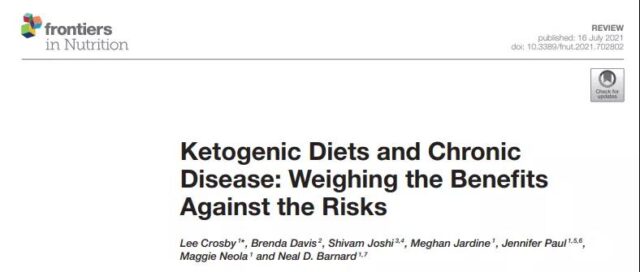Research found: Ketogenic diet is a disaster that promotes diseases
- Normal Liver Cells Found to Promote Cancer Metastasis to the Liver
- Nearly 80% Complete Remission: Breakthrough in ADC Anti-Tumor Treatment
- Vaccination Against Common Diseases May Prevent Dementia!
- New Alzheimer’s Disease (AD) Diagnosis and Staging Criteria
- Breakthrough in Alzheimer’s Disease: New Nasal Spray Halts Cognitive Decline by Targeting Toxic Protein
- Can the Tap Water at the Paris Olympics be Drunk Directly?
Research found: Ketogenic diet is a disaster that promotes diseases
Research found: Ketogenic diet is a disaster that promotes diseases. The ketogenic diet is a diet plan with a suitable ratio of high fat, low carbohydrates, protein and other nutrients.
It was originally a non-drug therapy for the treatment of refractory epilepsy in children with definite curative effect. In recent years, the ketogenic diet has become popular on the Internet, and is especially sought after by people who lose weight. It once became the peak of the diet in the weight loss industry.
When a person adopts a ketogenic diet, due to the low carbohydrate intake and the low blood sugar source, the body is forced to enter a state of “simulating hunger”. At this time, a large amount of body fat will be decomposed to supply energy to the body and finally allow the body to enter A high-speed fat burning state to achieve weight loss.
Early studies have shown that a short-term ketogenic diet can indeed effectively lose weight, and the weight loss effect is even better than the traditional low-fat diet. However, the ketogenic diet is often accompanied by obvious side effects, including fatigue, gastrointestinal dysfunction, arrhythmia, constipation, diarrhea, headache, and stunted growth.
Recently, Physicians Committee for Responsible Medicine (PCRM) and New York University and other researchers published a research paper entitled “Ketogenic Diets and Chronic Disease: Weighing the Benefits Against the Risks” in the “Frontiers in Nutrition” journal.
The study carried out the most comprehensive evaluation of the ketogenic diet so far. After weighing the pros and cons of this diet strategy and chronic diseases, it is believed that the ketogenic diet may cause long-term health damage.
Studies have shown that the ketogenic diet increases the risk of a variety of diseases, including heart disease, cancer, diabetes, and Alzheimer’s disease, more than its possible benefits.

In this study, researchers weighed the pros and cons of ketogenic diet strategies and chronic diseases under conditions such as epilepsy, obesity, diabetes, fatty liver, cancer, Alzheimer’s disease, heart disease, kidney health, and pregnancy.
The study drew five key health-related findings. For many patients, eating a ketogenic diet raises the level of bad cholesterol LDL-C, so it may increase the overall risk of chronic diseases. Similarly, people with kidney disease may experience kidney failure faster when they consume a high-protein ketogenic diet. And pregnant women will face potential neural tube defects in their babies even if they supplement with folic acid.
Not only that, the study also found that by limiting the number of carbohydrates in the ketogenic diet, the overall diet will be more inclined to foods that increase the risk of cancer.
In addition, extreme restrictions on carbon water will affect the quality of the diet, reduce the intake of fruits and vegetables, whole grains and legumes, and will lead to a lack of vitamins, minerals, fiber and phytochemicals in these foods. In the absence of multivitamin supplements, nutritional deficiencies may also occur.
The researchers also pointed out that common food types (red meat, processed meat, saturated fat) in the ketogenic diet are also related to other serious diseases, including cardiovascular disease, cancer, diabetes, and Alzheimer’s disease.
In the ketogenic diet, protein changes in the process of inducing ketosis, so that the body allocates as much protein as possible to gluconeogenesis, and only retains the minimum amount for tissue repair, which limits the protein in the human body. The function of play.
Furthermore, fat occupies such a high proportion, which often brings the risk of excessive intake of saturated fatty acids. The dietary guidelines for Chinese residents recommend that saturated fatty acids should be controlled below 7% of total dietary calories, otherwise the risk of cardiovascular disease will increase.
Researchers have found that the only well-supported use of this diet is to reduce the frequency of seizures in patients with certain drug-resistant epilepsy. Judging from the current research conclusions, the researchers said that for most people, the risks of a ketogenic diet clearly outweigh the benefits.
In short, a healthy diet is the kingly way, no matter what kind of diet, only a reasonable match is good for health, and if you choose improperly, it will be harmful. To a large extent, most diseases are related to diet. Adjusting the diet pattern and improving the diet are the shortcuts to disease prevention.
(source:internet, reference only)
Disclaimer of medicaltrend.org
Important Note: The information provided is for informational purposes only and should not be considered as medical advice.



